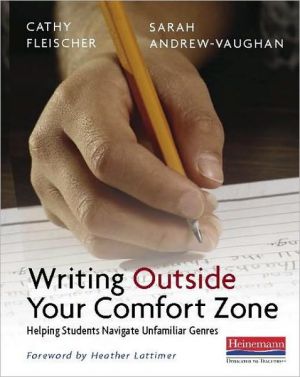

 |

|

The average rating for Writing Outside Your Comfort Zone: Helping Students Navigate Unfamiliar Genres based on 2 reviews is 5 stars.
Review # 1 was written on 2009-01-27 00:00:00 Joseph Edington Joseph EdingtonI feel sort of ashamed that I'm only just now getting around to reading this book since Cathy Fleischer has been such a mentor to me in my MA program at Eastern Michigan University. I feel like this book has been the theory and practice that my writing instruction was missing. Helping students navigate unfamiliar genres is so incredibly important because once they have learned to examine the unknown, they will be more self-motivated to continue learning that which is unfamiliar, intimidating, or downright scary, even when it's not required for a grade. |
Review # 2 was written on 2012-07-26 00:00:00 Jonathan Olson Jonathan OlsonIf you've ever tried the multi-genre project in school, you know that it is a time-consuming but rewarding task. This book is a riff of sorts, the gimmick being that students are encouraged to write in a genre they are uncomfortable with. Of course, a bit of the honor system comes into play when you ask them to pick. Anyway, the good part for teachers: You can take this idea and adapt it in any way you see fit. Let's start with some unusual "unfamiliars." Two that are detailed as "warm-ups" for the project might make interesting one or two-week exercises, even for teachers who take a pass on the full UGP (Unfamiliar Genre Project). The first one is comic-strip writing. Cathy Fleischer and Sarah Andrew-Vaughan not only use Scott McCloud's Understanding Comics as a resource, they use Scott himself as a guest speaker for two days. The next small and unfamiliar genre is writing blurbs about authors. I like this because students pretend to be writers themselves and write their own blurb. The operative words here are "inquiry" and "workshop." The authors first immerse students with plenty of exemplars of the chosen genre. Students then "notice" and create lists of the genre's characteristics. Once a genre is selected, the student keeps a research journal as she delves deeper into the genre, finding examples to read in full (if short) or in excerpts (if book-lengthed). Mini-lessons on writing are given and notes are kept in a "How-To Book," a record of craft. Students will ultimately write their own version of the genre studied -- the crown jewel of the project. They not only make an MLA bibliography, but also write an "Annotated Bibliography" where they comment on each source, its value, what was learned from it, etc. Finally, the students write a reflective letter on the project at the end AND get a "Letter from an Interested Adult." The last is usually a letter from Mom or Dad, who read the final product and write a letter of their thoughts about it. I like that idea as it expands the audience. For workshop practitioners, especially those with all-writing courses, this is a nice add to the library. In the final chapters, such variations as UGPs based on journalistic writing and memoir are included. The journalism one was intriguing, not because I teach journalism, but because journalistic writing is the most obvious real-world application of writing students will see. Why shouldn't they learn a few of its forms, then -- yes, in regular English classes, middle school or high school? Rhetorical question, that. |
CAN'T FIND WHAT YOU'RE LOOKING FOR? CLICK HERE!!!